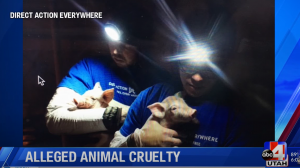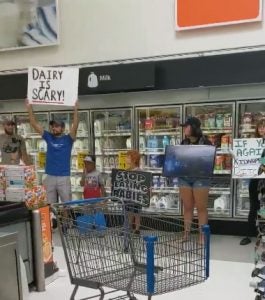Incidents of public demonstrations and protests from animal rights activist groups are climbing. In 2022, extremist groups glued themselves to Starbucks countertops and chained their wrists to basketball hoops during televised games in hopes of channeling public attention to their campaigns.
While these radical tactics may seem like the primary danger is out in the open, a greater looming threat to animal agriculture is emerging from the courtroom: the rise of animal law.
Targeting the food and farming communities from the witness stand isn’t a new tactic, but it is an increasingly threatening one. Incidents of “undercover” animal right activists trespassing on farms and stealing animals is becoming more common. Several activist groups even encourage and celebrate these individuals — especially those who are taken into custody — as martyrs to their cause. Videos recorded illegally by activists inside farming facilities, what they like to call “undercover videos,” are nearly always filmed out of context and made to appear sadder and bleaker than reality.
Perhaps even worse, some animal-rights groups have been known to wholly fake such videos, like when PETA depicted a cat being abused in a video — the cat, it turned out, was a CGI creation and not at all real. In other cases, the activists have been suspected of instigating on-farm animal abuses to ratchet up the disturbing nature of what was being filmed.
Related: Viewpoint: Targeting ag youth brings out the worst in animal-rights activism
Activists then weaponize these videos by submitting them as evidence of cruelty or neglect without providing any perspective from the farmer or an understanding of safe, modern farming practices.
In a recent case, activists from Direct Action Everywhere were charged with stealing two piglets in 2017. Video footage that the men had taken during the incident was presented to the court as part of the defendant’s testimony that the piglets were a “liability” to the farm and needed saving from “certain death.” Ultimately, the jury found the men not guilty, setting a dangerous precedent for future offenses against farmers and ranchers.

Some states have decided to protect the front lines of their food supply by passing farm protection bills into law, like Alabama and Arkansas. These laws are designed to prevent animal rights activists from gaining illicit employment or from trespassing with the intent to damage the farms’ reputation or property.
However, these “ag-gag” laws can only protect farms so much. Proper farm security should always be a priority for farmers and ranchers as a means of not only safeguarding their livelihoods, but also protecting their animals from scary biosecurity threats.
In addition to using these videos in court, animal lawyers and supporters are looking to bend the law in their favor in other ways. Several states have now introduced Courtroom Animal Advocate Program (CAAP) bills that would provide animals a legal advocate to represent them in criminal cases concerning animal welfare or neglect. That means your dog (or technically, your dog’s lawyer) could “recommend” to the court that you pay for additional rehabilitation or veterinary fees for the rest of that animal’s natural life if an accident were to happen on your property.
These advocate programs are just one way that animal-rights activists are taking small steps toward manipulating the law to grant full human rights to animals. Some activists are also seeking to restructure the definition of “legal personhood” by using obscure historical precedents to compel the judicial system to recognize animals as cognizant and capable of feeling human-like emotion.
In more extreme cases, animal-rights supporters are even writing writs of habeas corpus on behalf of animals, which are used to report an “unlawful detention or imprisonment” and orders the court to bring the custodian of the person to court. Many unsuccessful attempts for legal personhood have already been made, such as in the case of Happy (an elephant from the Bronx Zoo) and Justice (a horse from Oregon).

Extremist tactics like these largely rely on media attention and sensationalism of these undercover videos in order to succeed in garnering public awareness of their cause. Animal-rights activism is big business, and many of these activist groups working together in secret share a goal to dismantle animal agriculture and remove animal proteins from our plates under the guise of improving animal welfare.
Don’t let activists fool you into thinking climate-controlled barns, automated milking machines and customized nutrition plans are bad for animals when they don’t even stop to ask before stealing them from farmers!
Michelle Miller, the “Farm Babe,” is an internationally recognized keynote speaker, writer, and social media influencer and travels full time to advocate for agriculture. She comes from an Iowa-based row crop and livestock farming background and now resides on a timber farm in North Central Florida.



